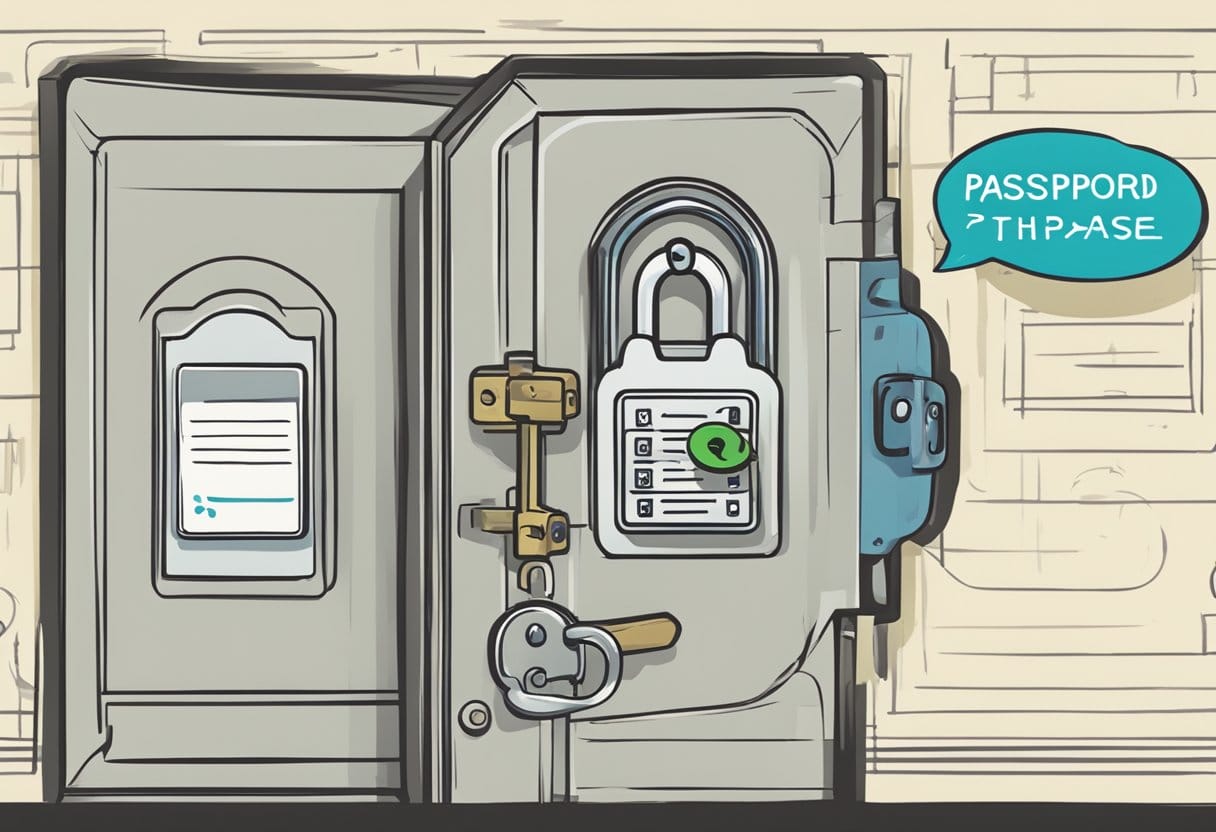Passphrases Are Less Secure Than Passwords: A Clear Explanation

Setting up strong security protocols to safeguard your online accounts is extremely important. Conventional approaches such as passwords and passphrases are frequently utilized for this purpose but their efficiency may vary. At an initial observation, passphrases appear to offer increased security. However, recent studies indicate that they might not actually be more reliable than traditional passwords.
Understanding the difference between passwords and passphrases is crucial in determining which option is more secure. Passwords are typically shorter, consisting of a combination of letters, numbers, and symbols. Passphrases, on the other hand, are longer and contain spaces, making them easier to remember. However, this ease of use may come at a cost to security.
Security experts have found that passphrases may be less secure than passwords due to the fact that they are often made up of common phrases or sentences. This makes them easier for hackers to guess or crack using brute force attacks. Additionally, passphrases may be more vulnerable to phishing attacks, where hackers trick users into revealing their account information.
Key Takeaways
- Passphrases may be less secure than passwords due to their common use of phrases or sentences.
- Passphrases may be more vulnerable to brute force attacks and phishing attacks.
- When securing your online accounts, it’s important to choose a strong and unique password or passphrase for each account.
Understanding Passwords

When it comes to securing your accounts, passwords are the first line of defense. A password is a string of characters used to authenticate a user’s identity. Passwords are essential for protecting your data, but they must be strong enough to prevent unauthorized access. In this section, we will discuss the different types of passwords, common password mistakes, and the complexity of passwords.
Types of Passwords
There are several types of passwords, including simple, traditional, and complex passwords. Simple passwords are easy to guess and often consist of common words or phrases. Traditional passwords are a combination of characters, such as letters, numbers, and special characters. Complex passwords are longer and more sophisticated, consisting of a combination of uppercase and lowercase letters, numbers, and special characters.
Common Password Mistakes
One of the most common password mistakes is using weak passwords. Weak passwords are easy to guess and are often found in a common password database. Another mistake is using the same password for multiple accounts. This makes it easier for hackers to gain access to all of your accounts if they can crack one password. Additionally, using personal information, such as your name, birthdate, or phone number, as part of your password is a bad idea.
Complexity of Passwords
The strength of a password depends on its complexity. A password that is too simple can be easily cracked by a password cracking tool, while a complicated password can be difficult to remember. The ideal password is one that is both complex and easy to remember. A 12-character random password is a good starting point, but a 12-character sophisticated password is even better. A 15-character complex password is the recommended minimum, but a 15-character password that includes spaces and special characters is even stronger. A 20-character password is the strongest option.
Understanding Passphrases

Benefits of Passphrases
A passphrase is a sequence of words, a sentence, or a string of characters used to authenticate a user. Passphrases are considered more secure than traditional passwords because they are longer and more complex. A passphrase can be a random string of characters or a sentence that is easy to remember but difficult to guess.
One of the benefits of using a passphrase is that it is easier to remember than a password. A passphrase can be a sentence or a string of words that are meaningful to the user. For example, “My favorite color is blue and I love to travel” is a strong passphrase that is easy to remember.
Common Passphrases
However, using common phrases or sentences as passphrases can be risky. Hackers can use brute-force or pre-compute these passphrases, making them vulnerable to attack. For example, using a phrase like “I love you” or “password123” as a passphrase is not secure.
Complexity of Passphrases
To create a secure passphrase, it should be complex and difficult to guess. A four-word passphrase, such as “correct horse battery staple,” is a popular example of a strong and memorable passphrase. A mnemonic passphrase, such as “My very eager mother just served us nine pizzas” is another example of a passphrase that is easy to remember but difficult to guess.
Passphrases should be at least 15 characters long, but longer passphrases are even more secure. A 100-character passphrase is virtually impossible to guess. However, longer passphrases can be difficult to remember, so using a 4-5 word passphrase is a good compromise between security and memorability.
Some password managers have an auto-generate passphrase function that can create a secure passphrase for the user. These passphrases are usually a random string of characters that are difficult to guess.
Security Aspects

Authentication Methods
Authentication is the process of verifying the identity of a user or system. Passwords and passphrases are two common authentication methods. Passwords are typically shorter and contain a combination of uppercase and lowercase letters, numbers, and symbols. Passphrases, on the other hand, are longer and contain spaces between words. Although passphrases may seem more secure, they are not necessarily so.
Encryption Methods
Encryption is the process of converting data into a secret code to protect its confidentiality. There are different encryption methods, including key encryption and private encryption. Passwords and passphrases are used to encrypt data, but passphrases are not necessarily more secure than passwords.
Security Measures
Security measures are steps taken to protect a system or data from unauthorized access, use, disclosure, disruption, modification, or destruction. Some security measures include multifactor authentication, complexity rules, and encryption programs.
When it comes to passwords and passphrases, security experts recommend using complex login credentials that include a mix of uppercase and lowercase letters, numbers, and symbols. However, overly complex passwords and passphrases can be difficult to remember, leading users to write them down or use the same password for multiple accounts.
Brute force attacks and dictionary attacks are two common methods used by threat actors to crack passwords and passphrases. A brute force attack involves trying every possible combination of characters until the correct one is found, while a dictionary attack involves using a list of known words to guess the correct password or passphrase.
User Perspective

User Experience
As a user, you may find that passphrases are slightly more difficult to remember than passwords. This is because passphrases are typically longer and contain spaces and symbols. However, the extra effort to remember a passphrase is worth the added security it provides. Passphrases are considered to be more secure than passwords because they are longer and more complex, making them harder to guess or crack.
Common User Mistakes
The most common mistake users make when creating passwords or passphrases is using easily guessable information such as birthdates, names, or common words. This makes their accounts vulnerable to hacking attempts. Another mistake users make is using the same password or passphrase for multiple accounts. This means that if one account is compromised, all of their accounts are at risk.
Best Practices for Users
To create a strong password or passphrase, use a combination of lowercase and uppercase letters, numbers, and symbols. Avoid using easily guessable information such as birthdates, names, or common words. Additionally, use a different password or passphrase for each online account to prevent all of your accounts from being compromised if one is hacked. Consider using a password manager to store your passwords or passphrases securely.
The average password is typically shorter and less complex than a passphrase, making it easier to guess or crack. A one-word password is particularly vulnerable to hacking attempts. A password generator can create a strong password for you, but a passphrase is still considered to be the strongest form of authentication.
For the majority of users, the user experience of using a passphrase is similar to using a password. However, it is important to note that some systems may not accept spaces or symbols in a passphrase, which can limit the strength of the passphrase.
Real World Examples

Case Studies
When it comes to password security, many people believe that using a passphrase is more secure than using a password. However, this is not always the case. In fact, there have been several high-profile cases where passphrases have been compromised.
One example is the 2012 hacking of the email accounts of former President George W. Bush and his family. The hackers were able to gain access to the accounts by guessing the answers to security questions, which were based on passphrases. This shows that even a complex passphrase can be vulnerable to hacking if it is used in a security question.
Another example is the 2013 hack of Adobe, where attackers were able to steal the encrypted passwords of millions of users. Despite the fact that many users had used complex passphrases, the attackers were still able to crack many of them using prewritten hacking tools and computational resources.
Famous Quotes
There are many famous quotes that emphasize the importance of strong passwords, but few that mention passphrases. One notable exception is from security expert Bruce Schneier, who said, “Passphrases are the future of passwords.” While Schneier is a respected expert in the field of security, it is important to remember that passphrases are not always the most secure option.
Company Policies
Many companies have policies in place that require employees to use passphrases instead of passwords. For example, the 800-63 Digital Identity Guidelines published by the National Institute of Standards and Technology recommend the use of passphrases over passwords. However, some companies have begun to move away from this recommendation due to concerns about cloud data privacy and the potential for passphrases to be compromised.
When it comes to creating a strong passphrase, it is important to remember that a longer string of characters used in a complete sentence is more secure than a shorter string of random characters. However, it is also important to avoid common quotes or strings of characters that are easy to guess. Additionally, incorporating uppercase letters, numbers, and symbols can also increase the security of a passphrase.
Conclusion

In conclusion, while passphrases may seem like a more secure option than passwords, this is not always the case. While passphrases can be longer and more complex, they are still vulnerable to brute force attacks and other forms of hacking.
It is important to remember that the security of your data ultimately depends on how you manage your passwords and passphrases. Regardless of whether you choose to use a password or passphrase, it is crucial to follow best practices such as using unique and complex combinations of characters, changing your passwords regularly, and never sharing them with anyone.
Additionally, it is important to stay informed about the latest trends and developments in password security, and to be aware of common threats such as phishing scams and social engineering attacks. By staying vigilant and taking proactive steps to protect your data, you can minimize the risk of a security breach and keep your sensitive information safe.
Frequently Asked Questions
What is a passphrase?
A passphrase is a sequence of words, spaces, and other characters used to authenticate a user’s identity. Unlike a password, which is typically a single word or a combination of letters, numbers, and symbols, a passphrase is longer and more complex. Passphrases are often used to secure sensitive information such as financial accounts, email, and other online services.
How can I create a strong passphrase?
To create a strong passphrase, you should use a combination of words that are easy for you to remember but difficult for others to guess. You can use a combination of words, numbers, and symbols to make your passphrase more secure. Additionally, you should avoid using common phrases or words that are easy to guess.
What is the recommended length of a passphrase?
The recommended length of a passphrase varies depending on the level of security required. However, most security experts recommend using a passphrase that is at least 12 characters long. The longer the passphrase, the more secure it is.
Is it true that a passphrase is more vulnerable to password cracking tools than a traditional one-word password?
No, this is not true. In fact, passphrases are generally considered to be more secure than traditional one-word passwords. This is because passphrases are longer and more complex, making them more difficult to guess or crack using automated tools.
Are passphrases more or less secure than passwords?
Passphrases are generally considered to be more secure than passwords. This is because passphrases are longer and more complex, making them more difficult to guess or crack using automated tools. However, it is important to note that the security of a passphrase depends on how it is created and used.
What is the difference between a passphrase and a password?
The main difference between a passphrase and a password is the length and complexity. A passphrase is typically longer and contains spaces, making it more complex than a password. Additionally, a passphrase can contain symbols and does not need to be grammatically correct. A password is typically shorter and does not contain spaces or symbols.






